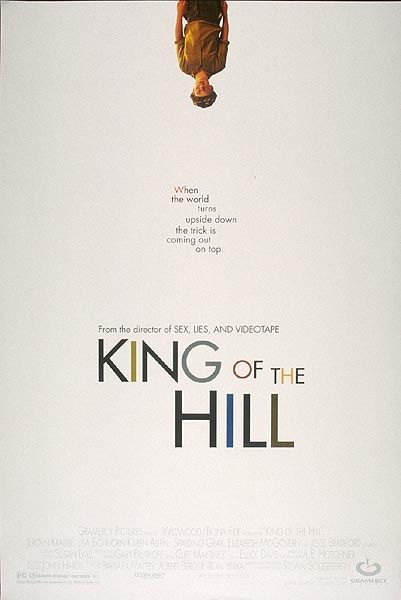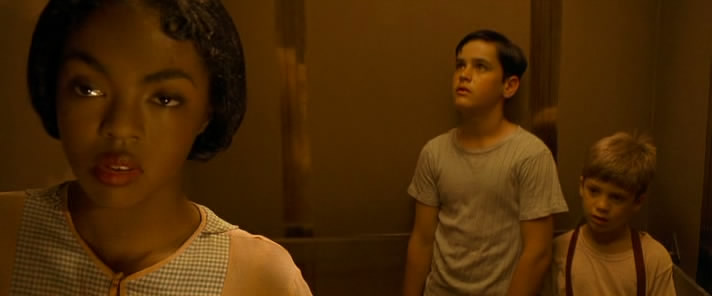
A St. Louis of 1933 shows the collapse of the average American nouveau riche, many economically comfortable families now forced into indigence if they lacked job security. For those who maintained power, an air of victory was evident (a boy trumps our protagonist, having met Charles Lindbergh instead of merely doing an imaginative essay on him); those who had it hard before the Depression were tossed into Dickensian tragedy. Somewhere in the middle lies the family of Aaron Kurlander (Jesse Bradford), subsisting on the small paychecks from his father’s failed business venture of selling glass candles door-to-door. Aaron has several friends who act as stand-ins for the different economic characters of the time: his classmate Billy (Chris Samples) is the son of a family who have managed to remain wealthy, floormate Lester (Adrien Brody) is driven to small crime to take care of his dying mother, his neighbor Mr. Mungo (Spalding Gray, an actor who Soderbergh would place intense focus in And Everything Is Going Fine) is a defeated bourgeois whose little pride lies in his hundred-dollar rhinoceros-bone cane, and Ella (Amber Benson), whose affection for Aaron is interrupted by her occasional seizures. These last human attachments are what keep Aaron stable as his family begrudgingly abandons him: his mother (Lisa Eichhorn) is called back to the sanitarium, his brother (Cameron Boyd) is sent to live with his uncle as they simply cannot afford to take care of him, and his father (Jeroen Krabbé) leaves to be a traveling watch salesman — their last hope of an income. However, even these connections are pulled from underneath him, each due to economic pressures ranging from sickness to suicide. Aaron’s battle to secure himself starts with stealing a suit for his graduation to imagining a steamy home-cooked meal from his magazine cut-outs. As the ensemble dissipates, Aaron becomes more despondent, yet always vivacious and obstinately clinging to a hope for life. It remains a sympathetic allegory of the psychological condition of a nation with only desperation in immediate sight.
Soderbergh manages to sidestep other vehicles of historical sympathy through his light tone, accentuated by the gold-laden cinematography of Elliot Davis and the airy piano score by Cliff Martinez. It occupies an emotional space between the grim, somber Schindler’s List and the goofy, mild Forrest Gump to reaffirm the state of American optimism without encouraging sappiness or rote melodrama. Even at its most humorous moments, the details of sweaty, disheveled characters and their destitute surroundings give a sense of triviality to their actions — a well-planned escape from the conniving bellhop (Joseph Chrest) serves more as a distraction than honest conflict. Indeed, since most of the film is from Aaron’s perspective, a child, tragedy is played through subtext. Bad news is never direct, and everyone is merely “sick” instead of suffering or dying. Lydia (Elizabeth McGovern) is merely a friend of Mr. Mungo working in “customer service,” her role of a prostitute only known to us by her clothes or the sly, dirty look Mungo delivers. Suicide is painted by a trail of water and blood. Naïveté (although Aaron always know more than adults give him credit) allows Soderbergh to work from a palette of subtlety engineered for a mainstream audience.
Aaron’s pain and alienation, told through Soderbergh’s lens, also offers a conversation about identity, both within the class structure (a favorite undercurrent theme in much of his work) and on a national scale. After reveling in the high ceiling canary-mating room, a passive hobby of Billy, Aaron is questioned about his living arrangement and his father’s line of work. Not to underwhelm the family, he retorts that his father flies for the government in secret missions as an explanation for his absence and to produce an image of bourgeois lifestyle — an image he expects to carry an air of normalcy and belonging, especially in the context of his pompous schoolmates. He keeps up this schtick to his teacher — a disconcerted frown implies she sees past it — and improves it when confronted by a pretty, rich girl at the graduation party, excusing his parents as lost archaeologists. “But I’m not worried. They get lost all the time.” Aaron’s necessity in clinging to this fabrication coincides with many Americans of this time — an identity crisis of a life of failure within the land of opportunity.
However, this crisis is soon resolved — Aaron’s brother is sent back according to the instructions of the forged letter Aaron sent as a plea to his uncle. Their father arrives upon taking the local job with the WPA (again, an action with Aaron as the catalyst, mailing the letter with a chicken scratch address), their mother was only one adult approval away from release, and the additional job security allows them to move into a ritzier apartment. It is a comfortable counterpoint to the wallowing portrait of self-subsisting suffering, but leaves it at that. The ending ultimately justifies the happiness divide between the have and have-nots, with no fateful reflection upon those in the tent cities, nabbed by policemen as an act of “cleaning up all the dirt around here.” It’s an honest fault, a sacrifice for a validation of Aaron’s honorable optimism, yet it manages a piece of political discourse — those who are poor are not uneducated, lazy, or nefarious — they’re simply poor.
Soderbergh’s fascination with underlying political structures and what dictates them pervades most of his filmography. King of the Hill shows the residual effect of those outside any political sphere, victims of their system, clambering for even a wrung to begin climbing the social ladder. Erin Brockovich and The Informant! rely on the conflicts residing in an opposing body politic and how individuals can influence and maintain power within them. He speaks highly of Pontecorvo’s The Battle of Algiers and coarsely of the power structure dictating Hollywood filmmaking. Political readings are inseparable from his procedure, so it is not surprising that he works well when dealing with the victims of political quandaries, impacting with empathy rather than sympathy, catharsis rather than showmanship. When given an assignment to write on a great American hero, Billy chooses John Rockefeller as a charitable rich man, much like himself. Aaron chooses Charles Lindbergh, the adventurous, optimistic spirit of a nation plagued with unpredictability — a lone light for hope that Soderbergh crafts in Aaron.
— Zach Lewis




